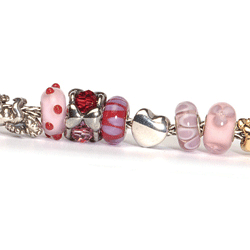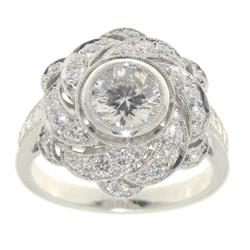
Customised jewellery is becoming a norm, symbolised here by the circular pendant that Kate Sutton of Uberkate created and is wearing.
Image Gallery (4 Images)
Customer-made jewellery the latest trend
 4.3 k views | By Carla Caruso • Journalist
4.3 k views | By Carla Caruso • Journalist
The move towards personalisation means old buzzwords like “handmade” are now giving way to jewellery’s latest trend – “customer-made”. CARLA CARUSO reports.
In today’s retail environment, personalisation is everywhere. Even simple tasks like buying lunch have become “bespoke”, thanks to chains like Subway and Starbucks, where customers can now choose not only their bread but also their beans – a grande, no-fat, sugar-free, cinnamon dolce latte with no cream? Whatever happened to ordering a coffee?Elsewhere, other retailers are hitting the trend: Shoes Of Prey allows female shoppers to design their own footwear online, specifying heel-height, toe-shape, material and colour; US fragrance brand Le Labo lets consumers have their own signature scents whipped up in perfume labs, and poured into bottles bearing the customer’s name; World Par-Tea blends unique tea to customer specifications.
Consumer preference is king and the internet is full of blogs that cover every definable niche for fans looking to specialise.
The jewellery world has also been impacted, the trend fuelled by a bevy of charm brands that allow customers to mix and match beads and materials to suit their tastes.
Jane Tonkin, Australian representative for Trollbeads, says charms are helping to set the wearer apart as an individual. “In a mass-produced consumer world, it gives an opportunity for people to express their individuality,” Tonkin explains. “Consumers can now have the input to design their own jewellery. They can explore the world of precious stones, pearls and colours to express who they are through jewellery.”
It didn’t take the charm phenomenon for savvy independent jewellers to realise that personalisation is one way to create a point of difference from the chain stores – after all, customised jewellery is as old as adornment itself. With fewer retailers offering on-site manufacture, however, stores are now stimulating sales by turning to suppliers who specialise in hand-crafted interchangeable components. It’s a move, according to business coach Barry Urquart, driven by businesses looking to meet increased demand for personalised customer service.
“To a large extent, it’s a kickback reaction to the ‘commoditisation’ of customers where, when you deal with a telecommunications company or bank, you literally just become an account number,” says Urquhart, the managing director of Perth market research and strategic planning practice Marketing Focus. “People are saying, ‘No, I’m more than that. I really want something to be individual, unique and very personal. I want it to be a projection of me and my personality’.”
Cost-cutting as a result of the Global Financial Crisis (GFC) has particularly harmed customer service, according to Urquhart: “Now we are dealing with staff who lack product knowledge and don’t have the authority to fulfill customer expectations but, if you are a jeweller who is trained and experienced, and can say, ‘I can help design and manufacture a product for you’, it makes a customer feel very special and very individual – everyone wants to believe |they are special.”
Michael Edwardson, principal consumer psychologist at Melbourne consultancy firm Psychologica, says retailers are also now dealing with a new type of consumer called the “prosumer”. “The consumer has typically been someone who receives a service,”
Edwardson says, “but the ‘prosumer’ is a consumer who wants to be part of the creation process,” Edwardson says, adding that this is because of a “grassroots backlash against mass consumption”. ”A customer’s not going to make their own iphone, for instance, but they’re certainly going to use it in a way that’s more personalised,” he adds, stating that the emergence of the prosumer signifies the inevitable rise of a new “creative class”.

Trollheads
Large organisations have recognised this trend and have come up with “co-creation”, according to Edwardson. “They take some of these lead consumers and bring them in, so they can help design new products and be part of the creative process,” he says, adding that the movement is one that organisations need to now understand: “There’s no longer a one-way conversation; it’s very much about an interaction with this new consumer and it’s happening everywhere.”
Consumer site Trendwatching.com says the trend of “co-creating” with customers is an important one to watch. “Tapping into the collective experiences, skills and ingenuity of hundreds of millions of consumers around the world is a complete departure from the inward-looking, producer-versus-consumer, innovation model so common to corporations around the world,” claimed the website in an online report on the phenomenon.
Jewellery suppliers are already effectively tapping into this desire for personalisation, including the consumer where posssible. Sydney’s Uberkate creates hand-crafted, customised jewellery in gold and silver, which can be embossed with names, dates and words that have special meaning to a customer.
Uberkate designer Kate Sutton says the business concept came about five years ago: “When I had my first daughter and she was about 18 months old, I was travelling a lot for work. I missed her so much that I ending up making my first set of ‘Ubercircles’ – one with my daughter’s name, one with my husband’s name, and one with my own name.”
The circular pendant style is now a signature for the brand. “They’re like a lucky charm – people don’t take them off and wear them for years,” Sutton explains. “Wearing a part of someone you love, you can take them anywhere. It’s empowering.”
Another brand to tap into the personalised trend is Jungyun Yoon, whose Inner Message rings carry customised mantras, idioms, poems or prose on the finger when worn. The rings are available from Australian e-boutique Oye Modern, and “marry me” and “always” have been popular choices so far. As well, Sydney contemporary jewellery label Najo has released silver enamel lockets, which are engravable and feature a choice of pendants, such as birds, hearts or flowers.
At a retail level, personalisation can also be employed in various ways. Colin Pocklington, managing director of independent retailer buying group Nationwide Jewellers, says made-to-order pieces have been a growth area in the past six years. “We recognised some time ago that it was as an opportunity for independent jewellers to separate themselves from the chains because more and more consumers are looking for jewellers who can design and make something different for them.”
Retailers have been riding the customised jewellery wave for some time, with many high-end jewellers such as Keshett and Kailis offering customers the chance to design and create hard-to-find items such as emerald, ruby or pearl engagement rings.
To “skill up” independent retailers, Nationwide Jewellers employs top jeweller Rex Steele Merten, winner of four Diamonds International Awards and many Australian design gongs. “He’s got a special template for designing jewellery faster and better,” Pocklington says of Merten, “and we’ve had him running sketching classes for our members at trade fairs and conferences.

Keshett
“We’ve also been taking jewellers to Antwerp twice a year to buy diamonds on the basis of designing a ring or a piece of jewellery for a customer, rather than just offering something off the shelf,” Pocklington adds.
Store design is also essential in made-to-order, according to Pocklington: “If you want to get into this area, you probably need to have a sit-down area in the store – you’ve got to think of the practical side of doing it, preferably with quality pictures of jewellery.”
The ability to offer other individualised services, such as repairs, can also help bring customers into a store. “The person who comes in today to get a new watch battery may well be buying an expensive piece of jewellery next month or next year, so when they do come to think of jewellery, they’ll think of you.”
Pocklington says customers need to know about these add-ons: “You’d want to have some sort of quality signage at the front of your shop listing your services. Really communicate to your customers what you do.”
Karen Kelly, a designer at Sydney retailer Dracakis Jewellers, says Dracakis is a store whose business is built on made-to-order: “We can personalise because we have jewellers on the premises. We can draw up a design on the spot and make it in-house,” she states, adding, “It’s basically a bespoke piece – it’s completely tailored to the individual client every time.”
Kelly says jewellery needs to be personalised because purchases are so often linked to occasions of grand emotion. “Customers want it to represent them in the truest form,” she says. “It’s something that they’re planning to reflect who they are for the rest of their lives.”
Michelle Black, a designer at Canberra’s Creations Jewellers, says the custom-designed part of their business continues to grow, with three jewellers and a team of designers now on-site. “Our focus is on individual designs,” Black explains. “We sit down with people and get to know them and their personalities and their ideas. We work with them with our technical knowledge and try to produce something that is close to what they want, in a practical sense.”
Black says Creations prides itself on good, old-fashioned service and being involved in the whole process of jewellery design: “We have clients who have come to us for years, as have their children and their grandchildren. We become the family jeweller and it’s really lovely to create for generations of a family.”
Indeed, it seems, the ability to offer a degree of personalisation can help a business stand out from the pack, whether in creating made-to-order designs at the retail end or suppliers allowing for personalised touches on their accessories, like engraving or embossed words.
Ultimately, retailers who work to satisfy the increased desire for individualised jewellery just might be able to personalise a little of what is a growing profit pie for themselves.
Posted August 24, 2010